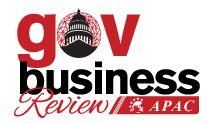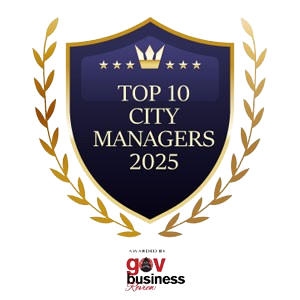Thank you for Subscribing to Gov Business Review Weekly Brief
Dalton Rice serves as City Manager at City of Kerrville, Texas, a thriving community of about 25,000 residents. Kerrville is a full-service city that provides police, fire, reclaimed water, electric power, and more. At the helm of this organization, Rice leads nearly 350 employees across a wide range of disciplines, supported by two assistant city managers who serve as chief administrative officer and chief operating officer.
Rice’s responsibilities extend far beyond day-to-day operations. He works at the critical intersection of politics, governance, and community life, advising City Council while serving as a bridge to residents. His approach emphasizes transparency, collaboration, and civic engagement. Whether facilitating dialogue with community groups or translating council vision into actionable strategy, Rice focuses on building trust and delivering results. Following is the conversation that we had with him. Applying Service and Strategy to Local Government My journey into city management was anything but traditional. In fact, I sometimes joke that it is just a fancy way of saying I did not know what I wanted to be when I grew up. I spent nearly 14 years in the military, most of it in special operations. After that, I worked as a firefighter and paramedic, experiences that gave me a deep understanding of public safety and the pressures first responders face. Later, I entered the healthcare field, where I gained insights into benefits, strategy, and long-term planning. Each stage of my career gave me different tools, perspectives, and lessons. Across all of these roles, two themes were consistent: service to others and the importance of relationships. The military taught me discipline and resilience, but it also showed me the necessity of diplomacy. Special Operations, Firefighting, and EMS ingrained in me the ability to stay calm in the storm, to keep a level head when chaos surrounds you. Healthcare opened my eyes to systems thinking, strategy, and the long-term implications of decisions. Combined, these experiences have shaped how I lead a city government today. Steady Hands in Times of Crisis Although some people resist viewing cities as businesses, I believe the comparison is valid. Public works, for example, functions much like an enterprise: we provide water and infrastructure, and revenue flows back in through services. At the same time, departments such as police and fire are not revenue-generating, but they are vital to the community. City management requires bringing all of these different “businesses” together under one umbrella, one budget, one vision, and one policy framework. I often describe it as being a chief executive officer who manages multiple businesses simultaneously. Each has its own unique needs and challenges, and it is a city manager’s responsibility to align them toward the collective future of Kerrville. These lessons proved invaluable when Kerrville faced one of its most devastating moments in Texas: a historic flood that struck our community. This area became ground zero for unimaginable destruction. Navigating that disaster required calm, steady leadership, and resilience. Building Resilient Cities through Empowered Leadership At the core of my leadership philosophy is empowerment. I believe in hiring the right people, putting them in the right place, and giving them authority. I do not just delegate tasks; I delegate responsibility. My role is to set the vision, provide high-level guidance, and trust department directors to be the experts in their fields. This philosophy is best illustrated by real examples. Our fire department was struggling with overtime and staffing challenges. Instead of dictating exactly how they should fix it, we presented them with clear objectives: reduce overtime, manage costs, and find ways to improve pay and structure. The department came back with a plan that exceeded all expectations. They added an EMS lieutenant, built a succession pathway, hired more personnel than they originally thought possible, and still reduced expenses. By empowering them to take ownership of the problem, we achieved solutions that were sustainable and innovative. Another case came from our utilities and public works departments. Kerrville is a drought-prone area, which means irrigation revenues are unpredictable. For years, too much of our budget relied on those revenues, and the city faced serious deficits when rainfall patterns shifted. We challenged our finance and utilities teams to rethink the model. By scaling back reliance on irrigation revenue and instead tying base rate adjustments to inflation, we were able to stabilize the system. What was once a million-dollar deficit became a balanced budget, and allowed us to set additional money aside for capital improvement projects. This was a turning point for our financial resilience. Guiding through Crisis and Renewal One phrase my leadership team and I often use is that we are big on yes. The question we ask is, “How do we find the answer to yes?” Sometimes the original idea does not pan out, but exploring it often reveals an even better solution. This mindset fosters innovation, builds stronger teams, and creates a culture where directors feel trusted and empowered to take risks that move the city forward. The flood forced us to reassess and shift our priorities. Today, our focus is firmly on recovery and resilience. For us, this means addressing three interconnected areas such as search and recovery, economic and long-term recovery, and debris management and rebuilding. While search and recovery operations will eventually slow, they remain a part of our daily efforts. At the same time, we are building long-term recovery plans through multiple task forces dedicated to housing, business recovery, infrastructure, volunteerism, and more. I currently serve as chairman of the Kerr Economic Development Corporation, which is leading much of this work in partnership with community stakeholders. Debris management represents another massive challenge. To put it in perspective, Kerrville has more debris from this disaster than Hurricane Harvey produced in Texas— two months post disaster we are well over 600,000 cubic yards and counting. Coordinating with state and federal partners, we are methodically clearing and rebuilding. Every day we make progress, but the sheer scale of the task underscores the severity of what our community and region has endured. Calm in the Storm, Strength in the Future Even amid devastation, I see opportunity. The word I keep coming back to is reimagine. This disaster was one of the worst in Texas history, but it gives us a chance to rethink everything: how we design our parks, how we support tourism, how we grow businesses, how we build infrastructure, and how we prepare for the future. Less than two months removed from the flood, we are already asking these questions and exploring how to rebuild not just what was lost, but something stronger, smarter, and more resilient. Resilience is critical, and so is mentorship. Every leader needs people they can lean on—mentors, coaches, peers. Along the way, you learn from everyone you encounter: the good, the bad, and even the ugly. Each interaction shapes you and provides lessons to carry forward. Public service also comes with a unique sense of camaraderie. City managers across the country share a brotherhood and sisterhood that is rare in other professions. I can pick up the phone, call a colleague, and ask what worked for them, what didn’t, and how they handled a challenge. That willingness to share knowledge makes all of us stronger. Looking back, I see how every step of my journey has prepared me for this role. It was not a straight path, but each experience brought lessons in discipline, service, strategy, and resilience. At its core, this work is about serving others, building trust, and creating communities where people feel supported and connected. City management is demanding, no doubt, but it is also full of opportunity. The future of Kerrville depends on our ability to reimagine, rebuild, and lead with both creativity and compassion. For me, it is more than a profession—it is a calling. And despite the challenges, I cannot imagine doing anything else.



